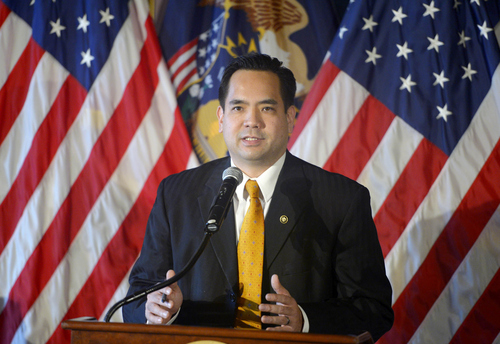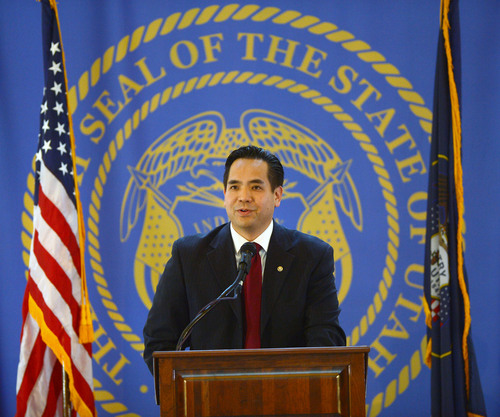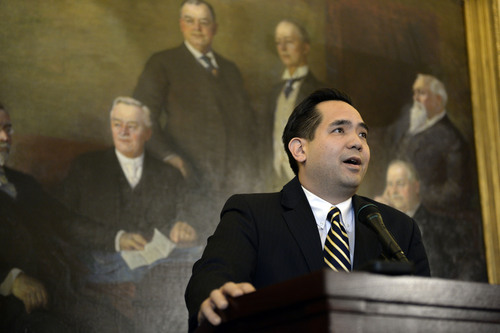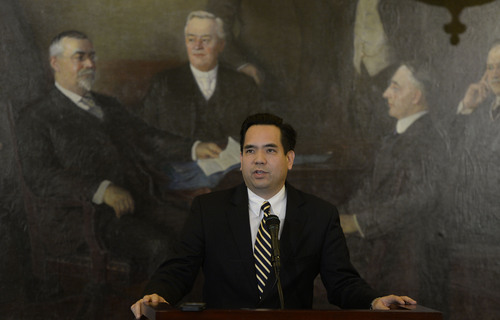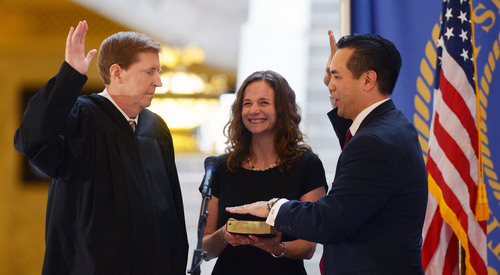This is an archived article that was published on sltrib.com in 2014, and information in the article may be outdated. It is provided only for personal research purposes and may not be reprinted.
The top law officers in 11 states — including Utah Attorney General Sean Reyes — argue in a Nevada case that no fundamental right to same-sex marriage exists and that allowing such unions will lead to "any group of adults" seeking that status and the "tragic deconstruction" of marriage.
"If public affirmation of anyone and everyone's personal love and commitment is the single purpose of civil marriage, a limitless number of rights claims could be set up that evacuate the term 'marriage' of any meaning," the attorneys general said in a newly filed amicus brief in the 9th Circuit Court of Appeals.
And once "natural limits" are gone, "it follows that any group of adults would have an equal claim to marriage," the attorneys general said.
The filing may highlight points Utah will make in its opening brief, which is due to be filed Monday in the 10th Circuit Court of Appeals.
Other attorneys general who signed the document are from Alabama, Alaska, Arizona, Colorado, Idaho, Montana, Nebraska, Oklahoma, and South Carolina. Tulsa County in Oklahoma, which also is in the 10th Circuit, is appealing a lower court decision that struck down a state ban on same-sex marriage.
In November 2012, U.S. District Judge Robert C. Jones of Nevada ruled the state's ban, approved by a majority of voters in both 2000 and 2002, is not discriminatory, upholds a legitimate state interest and is, therefore, constitutional.
"Homosexual persons may marry in Nevada, but like heterosexual persons, they may not marry members of the same sex," Jones ruled. "In this sense, the state of Nevada has drawn no distinction at all. … The state has not crossed the constitutional line by maintaining minor difference in civil rights and responsibilities that are not themselves fundamental rights comprising the constitutional component of the right to marriage, or by reserving the label of 'marriage' for one-man-one-woman couples in a culturally and historically accurate way."
Should marriage rights be expanded, the judge said, it is conceivable that "a meaningful percentage of heterosexual couples would cease to value the civil institution as highly as they previously had and hence enter into it less frequently" with a possible end result being an increase in out-of-wedlock births, single-parent families and property disputes.
The couples appealed.
The attorneys general say 33 states adhere to a "historical" definition of marriage, which predates the nation's founding and is centered on procreation, that limits access to the civil institution to one man and one woman.
"The theory of traditional civil marriage, that is, turns on the unique qualities of the male-female couple for procreating and rearing children under optimal circumstances," they argue. "As such, it not only reflects and maintains deep-rooted traditions of our nation, but also furthers the public policy of encouraging biological parents to stay together for the sake of the children produced by their sexual union."
Civil marriage "channels" sexual desires into stable unions, they said, and has a core purpose of "ameliorating the frequent consequences of heterosexual intercourse, namely the unintended issuance of children."
The attorneys general said traditional marriage laws do not target sexual orientation per se and thus must be reviewed and upheld if they are based on a rational government interest — that is, procreation and child-rearing.
"Traditional marriage is too deeply embedded in our laws, history and traditions for a court to hold that the choice to adhere to that definition is irrational," the filing states. "Civil marriage recognition arises from the need to protect the only procreative relationship that exists, and in particular to make it more likely unintended children, among the weakest members of society, will be cared for."
"It creates a norm where sexual activity that can beget children should occur in a long-term, cohabitative relationship," the filing states.
Same-sex couples "plainly fall outside the scope" of a fundamental right to marriage, in part because their sexual activity does not entail similar consequences.
"Whether through surrogacy or reproductive technology, same-sex couples can become biological parents only by deliberately choosing to do so, requiring a serious investment of time, attention, and resources," the attorneys general note. "Consequently, same-sex couples do not present the same potential for unintended children, and the state does not necessarily have the same need to provide such parents with the incentives of marriage."
Extending marriage rights to same-sex couples, which do not rely on a sexual, procreative basis, could require states to recognize any relationships as "marriages" if the parties involved requested that status — from platonic friendships and business partnerships to incestuous or kinship relationships.
"Once the link between marriage and responsible procreation is severed — not simply stretched, but severed — and the commonsense idea that children are optimally raised in traditional intact families rejected, there is no fundamental reason for government to prefer couples to groups of three or more," the filing states.
The attorneys general said barring same-sex marriage is not discriminatory because it treats gays and lesbians equally and is thus unlike the racial bars that were overturned in Loving v. Virginia, the U.S. Supreme Court decision that found prohibiting interracial marriage was unconstitutional.
While the lower court judge also "paradoxically" found that "at most" Nevada's law was aimed at maintaining "heterosexual superiority or 'heteronormativity,'" the attorneys general said, there is no basis for "deducing any such discriminatory intent" in the state's law.
They also argue that inferring any discrimination in Nevada's recent decision to recognize civil unions while maintaining a traditional "benign" definition of marriage "unfairly penalizes, and can only discourage, social experimentation."
The fact that some opposite-sex couples are unable or do not want children nevertheless reinforces the "traditional marriage norm," the attorneys general said.
"Besides, it would obviously be a tremendous intrusion on individual privacy to inquire of every couple wishing to marry where they intended to or could procreate," the filing states. "States are not required to go to such extremes simply to prove that the purpose behind civil recognition of marriage is to promote procreation and child rearing in the traditional family context."
The filing draws conflicting conclusions about how the U.S. Supreme Court's decision in United States v. Windsor, issued last June, supports the states' positions. The decision upholds the right of states to regulate marriage, they say, referencing decisions that date back as far as 1888.
"The Supreme Court long ago identified the axiom of state sovereignty that 'the whole subject of domestic relations of husband and wife, parent and child, belongs to the laws of the states, and not to the laws of the United States,' " they said, quoting from an 1890 case.
The 9th Circuit Court's recent decision in another case, which drew on Windsor in concluding that it was unconstitutional to bar a prospective juror because of sexual orientation, doesn't apply, the attorneys general said.
"These technical, doctrinal inquiries only confirm what common sense tells us: traditional marriage arises from concern for opposite-sex couples, not same-sex couples," they said.
Twitter: Brooke4Trib


